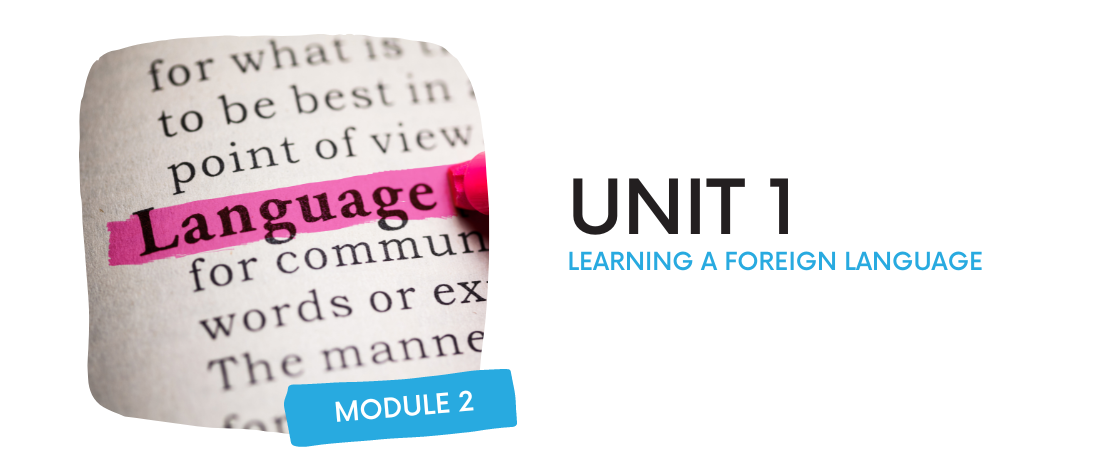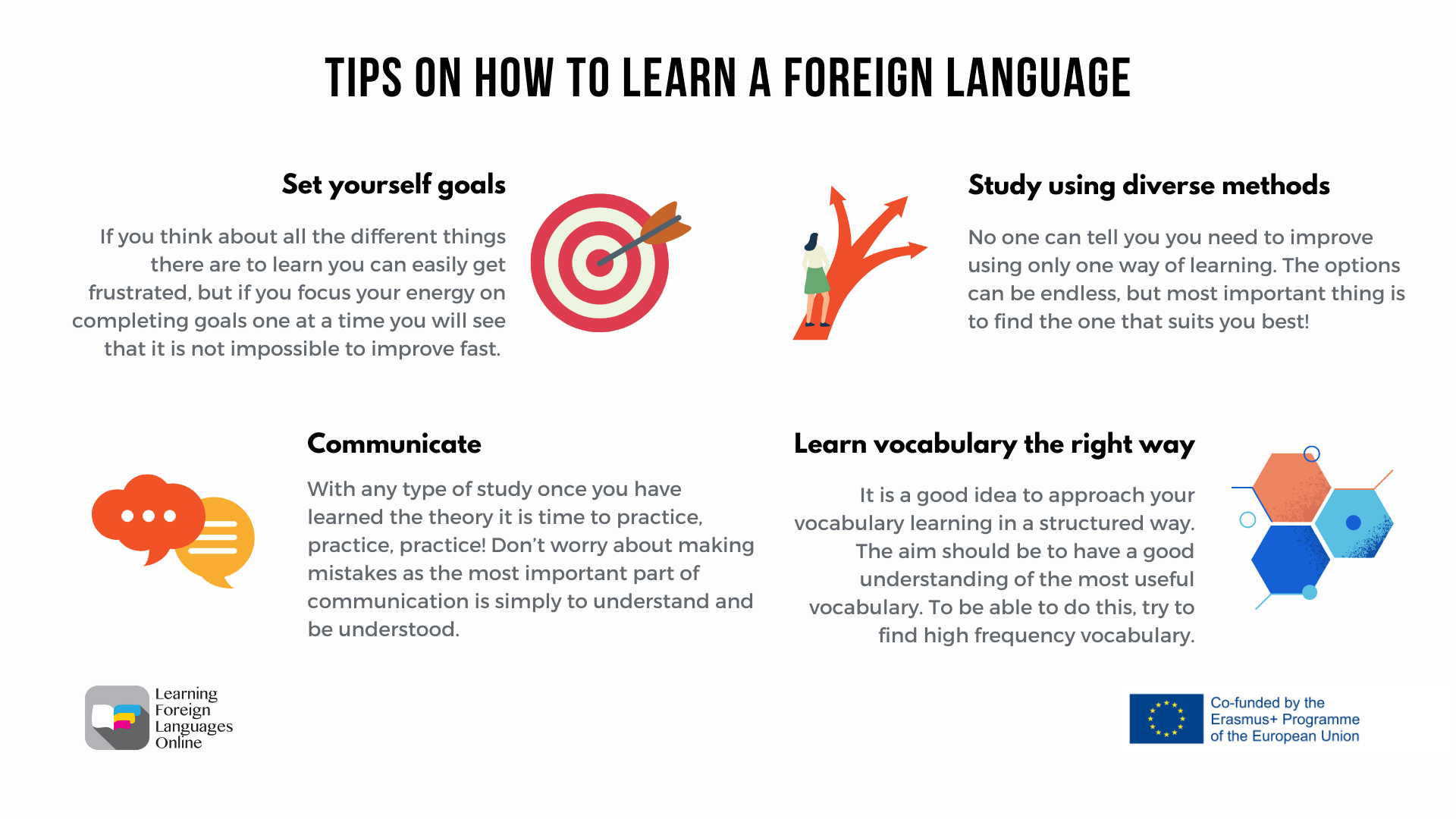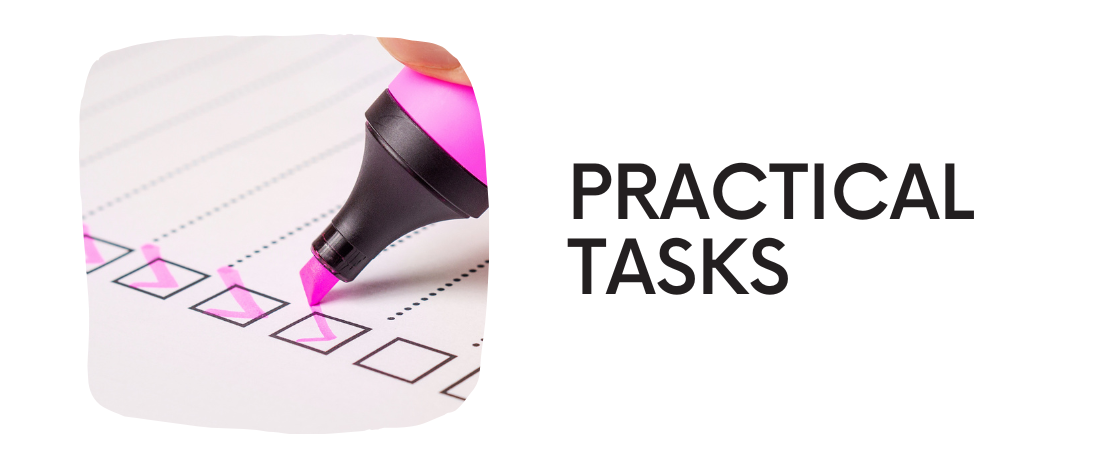
E-course
Learning a foreign language
Module 2 | Unit 1
Introduction

Learning a new language has a multitude of benefits. Not only does it make it easier to bring down barriers, did you know that it’s also good for your health!? How? Well, for one it improves your memory, but that’s not all, it also makes you better at communicating with others, it increases the size of your brain, makes you a better problem-solver and makes you more employable.
As the world becomes more and more interconnected, there has never been a better time to learn another language, (or two) Think it’s too difficult? Think again, it’s easier than ever and you can do it at a pace and a place that suits you.
Learning a foreign language is by no means ‘easy’ – nothing worthwhile ever is. If you are prepared to invest both the time and effort – you will surely reap the rewards and the benefits. This unit will give you tried and tested guidance that you or anyone else on a language learning journey might find useful.
Getting started

Tips on how to learn a foreign language

1. Set yourself goals
The first step towards learning a foreign language is to set yourself some goals. Learning a new language is time-consuming and it also involves many elements that you need to work on improving, some of them are: vocabulary, pronunciation, grammar, reading, listening and speaking skills.
With this in mind, it’s a good idea to set yourself manageable goals. If you think about all the different things there are to learn you can easily get frustrated, but if you focus your energy on completing goals one at a time you will see that it is not impossible to improve fast. This will go a long way in helping you reach your desired outcome.
2. Learn vocabulary the right way
All languages are made up of a fabulously rich vocabulary. Every day new words enter the language and old words change in meaning or even disappear entirely. Take as an example the English language; there are somewhere between 600,000 to 1 million words. Of course, native speakers do not know all of these words, but rather, they know those words that they need to use on a daily basis. Not all vocabulary is necessary to all people. A doctor may know words and phrases that a waitress does not and vice-versa. A server may know words that a doctor does not. The words that a person uses are relevant and specific to them, it is not essential to know words that may never apply to you.
It is a good idea to approach your vocabulary learning in a structured way. The aim should be to have a good understanding of the most useful vocabulary. To be able to do this, try to find high frequency vocabulary. The chances are, this type of vocabulary will be the vocabulary that proves most useful.
You can use online tools such as dictionaries or even just a quick Google search of high frequency words. – More on this in the vocabulary unit!
3. Study using diverse methods
When we think about learning something new most of us probably imagine a book, a notebook and boredom. This doesn’t have to be the case when you learn languages because they are like living organisms as people use them to express themselves. Which is wonderful news for you! You can incorporate things you are passionate about and that you enjoy doing in your learning so that it doesn’t seem like a lot of work. Watch a movie or a tv show, listen to the radio or songs in your target language, switch the language on your mobile phone. Maybe one of your friends already speaks the language you would like to learn, so ask them to talk to you about simple, everyday topics in this language. It is important to have diversity in your learning plan because in that way you will look forward to the time you need to spend studying instead of it feeling like a chore. No one can tell you you need to improve using only one way of learning. The options can be endless, but most important thing is to find the one that suits you best!
4. Communicate
Confucius once, long ago said: “I hear and I forget. I see and I remember. I do and I understand.”
Remember why it is important for you to learn your target language, keep this in mind and practice it as often as possible. It is one of the best ways to gain confidence in your knowledge and it is a great way to keep your self-esteem high. Even when the practice involves something on a beginner level like writing your shopping list in your target language, or something more complicated like ordering food in a restaurant, once you successfully communicate you will get the wonderful feeling of having put your knowledge to practice. Don’t worry about making mistakes as the most important part of communication is simply to understand and be understood.
With any type of study once you have learned the theory it is time to practice, practice, practice!
How can you practice? Well thanks to technology it’s easy!
TRY:
- Meeting another speaker of the language. If you don’t have any friends who are native speakers or who are able to speak the language, then look online. Online Gaming and social networking sites are great opportunities to make new friends and learn at the same time.
- Find and join a conversation club. In many European cities, there are conversation clubs that organize language exchange events. These events give you the chance to communicate with native or fluent speakers. You can search online for any that are happening near you. Can’t find one? Then there are apps and websites designed for this purpose (e.g., tandem).
- Find yourself a language partner online. Try a website such as coffee or My Language Exchange. These sites connect people from all around the world who are learning a language with people who are able to help with practice. There are also games and voice chat or text chat.
- Go abroad. Go to a country where the language is spoken. As well as lots of opportunities for speaking, you will also be able to experience the culture. There are many opportunities to volunteer abroad, where in exchange for your work you can have access to endless speaking practice. If you are currently a student, you may be able to apply for a traineeship. Through the European Solidary Corps, you can find many positions around Europe! If you are good with children, you could also think about finding work as an au pair.
Using all or even some of these tips will help you see noticeable improvements in your language learning. Think about which ones you like best and start trying to include them as part of your learning strategy, then watch your confidence and skills grow and develop!

More resources

Still want to continue learning about the topic of this unit? Not to worry, we have made a selection of further resources that you can use if you would like to find out more. Just click on the links and keep learning!
Practical tasks

 Create a timeline for your studying process and decide on small achievable goals for each of the categories that you need to cover: vocabulary, grammar, pronunciation, etc. For example, in a month I will have learned 30 new words, 2 grammar units, etc.
Create a timeline for your studying process and decide on small achievable goals for each of the categories that you need to cover: vocabulary, grammar, pronunciation, etc. For example, in a month I will have learned 30 new words, 2 grammar units, etc.
 Think of 5 new words that you have learnt recently. Identify how you have learned them. Was it when you were reading something or listening to a song, or maybe you heard someone say it? Once you become aware of what the best way for you to learn is, try to implement the same strategy to learning other parts of language as well.
Think of 5 new words that you have learnt recently. Identify how you have learned them. Was it when you were reading something or listening to a song, or maybe you heard someone say it? Once you become aware of what the best way for you to learn is, try to implement the same strategy to learning other parts of language as well.
 With a pen and paper watch a short video clip on YouTube in the language you are learning. Choose either a subject that interests you or a short film or even a cartoon. As you watch, listen for up to 5 words or phrases that you haven’t heard before. Make a note of them, pause the video if you need to. After the video has finished try to find definitions for them, and practice saying them, paying attention to your pronunciation. You can also record yourself and listen to your pronunciation.
With a pen and paper watch a short video clip on YouTube in the language you are learning. Choose either a subject that interests you or a short film or even a cartoon. As you watch, listen for up to 5 words or phrases that you haven’t heard before. Make a note of them, pause the video if you need to. After the video has finished try to find definitions for them, and practice saying them, paying attention to your pronunciation. You can also record yourself and listen to your pronunciation.
 Do some online research to find out what is going on in terms of language learning in your local area, can you find any informal chatting groups? Social media is a good tool for finding such groups. If there aren’t any, then why not think about starting one yourself!?
Do some online research to find out what is going on in terms of language learning in your local area, can you find any informal chatting groups? Social media is a good tool for finding such groups. If there aren’t any, then why not think about starting one yourself!?
 Try a website such as ‘coffee break languages’ or ‘My Language Exchange’. Spend some time familiarizing yourself with the setup and the services these sites offer. They might be very useful once you start practicing the language you are learning.
Try a website such as ‘coffee break languages’ or ‘My Language Exchange’. Spend some time familiarizing yourself with the setup and the services these sites offer. They might be very useful once you start practicing the language you are learning.
Unit test

